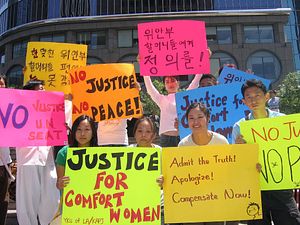The Japanese government is currently in talks with North Korea (DPRK) over the return of its citizens abducted in the 1970s and 80s. At the same time, it is reviewing the Kono Statement issued in 1993 that acknowledged the Imperial Japanese Army forced women across Asia to work in military brothels during the Second World War. Given the sensitivity of the ongoing talks with North Korea, the decision by Prime Minister Shinzo Abe’s government to continue its review seems poorly conceived. Other prominent Japanese politicians outside the ruling LDP have also made incendiary comments recently about Japan’s history with ‘comfort women.’ The response by both North and South Korea’s governments shows the danger Japan risks in attempting to rationalize this portion of its imperial past.
The discussions between Japan and North Korea have progressed better than anticipated, with Pyongyang agreeing to open an investigation into the remaining abductees in exchange for reduced sanctions and possible humanitarian aid. Government sources said on Saturday that another round of discussions could be held later this month in China, and would likely be between Junichi Ihara (director general of the Foreign Ministry’s Asian ad Oceana Affairs Bureau) and Song Il Ho (DPRK ambassador for talks to normalize relations with Japan), who chaired the initial talks in Stockholm where the agreement was reached.
The sources said that Japan wants North Korea to prioritize finding 77 possible abductees and 12 others who have officially not been returned, saying “The investigation should be conducted in the order of how suspicious the cases are as abductions.” The Abe administration wants Pyongyang to submit its first report on the issue by this summer, and will send a team to verify the results including officials from the Foreign Ministry and National Police Agency. Abe will only follow through on his proposed trip to North Korea if the government is satisfied with the progress of the reports. However, the government plans to ease sanctions once North Korea begins the investigation.
While these negotiations are ongoing, the Japanese government is also preparing to submit a report to the Diet concerning comfort women, which is expected to state that Japan and South Korea bargained over the wording of the 1993 Kono apology, and that Japan submitted to pressure from South Korea to admit “that the Japanese military was actively involved in the sex slavery,” according to the Japan Times. On Sunday the South Korean Foreign Ministry said that Seoul did no such thing, and that Japan admitted on its own to the army’s establishment of brothels, and that it forced women from the countries it conquered to work in them as sex slaves. Seoul also said that if the Kono statement is challenged, South Korea would retaliate and present its own materials to establish the issue.
Additionally, Osaka Mayor Toru Hashimoto, who last year said that comfort women were “necessary” to maintain morale during the war, said last weekend that other countries did the same thing at that time. “After landing in Normandy, allied soldiers raped French women. ‘Comfort stations’ were built after things became too much. Europeans and Americans say ‘Japanese used sex slaves.’ We have to educate Japanese who would be able to argue and reply to them, ‘We were wrong, but you were wrong as well,’” Hashimoto said, according to the Mainichi Shimbun.
North Korea’s official KCNA on Sunday addressed the recent attitude by Japanese officials toward the issue of comfort women. The news agency said “the ultra-right conservative forces of Japan are desperately shunning the redemption of its past crimes, still not admitting the sexual slavery for the Imperial Japanese Army.” It then went on to catalog and rebuke Hashimoto’s recent statements concerning comfort women, and held the government responsible for attempting to conceal the issue.
Considering how domestically popular the resolution of Japan’s abductee question would be for the government, it is curious that the Abe administration is continuing to review the Kono statement. Especially since not only has North Korea expressed its displeasure, but South Korea as well. While North and South Korea certainly don’t coordinate with each other on policy, Japan’s imperial past is one issue that does give them common cause. One way for South Korea to retaliate would be to incentivize North Korea to suspend is cooperation in the investigation of the abductees. More so than South Korea, China’s leverage in North Korea is substantial, and Japanese attempts to whitewash its wartime history draw a strong reaction from Beijing. Japan appears serious about learning the whereabouts of its abducted citizens, and possibly creating a more normalized relationship with North Korea. However, attempts to reinterpret its past could derail that process.

































